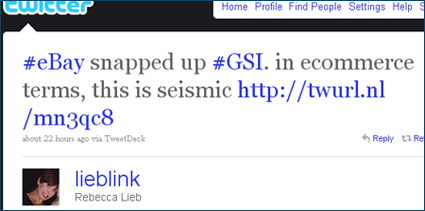Yesterday, shortly after the announcement of eBay’s plans to acquire GSI Commerce (a $2.4 billion deal), a friend, colleague and former director of Econsultancy US, Rebecca Lieb, tweeted:
GSI Commerce has a number of impressive assets, including an affiliate network they acquired in late 2009, and “180 clients including 31 of the Internet Retailer Top 50 retail companies like Toys ‘R’ Us” [source], RadioShack, Levi’s, Timberland, Calvin Klein, Ralph Lauren, recently-acquired Fanatics, and multiple others.
I couldn’t help but love Rebecca’s above-quoted choice of adjective (“seismic”), and decided to send around a few emails to find out what some of the industry leaders think this deal may mean for the ecommerce landscape.
Here are some of the commentary remarks I have received:
GSI has almost been fort of a stealth player in ecommerce for the past several years. Their client roster is stellar, but I don’t think there’s real awareness of the scale of their operations in the industry, or the potential threat it poses to others with digital offerings. The power they’re bringing to their offerings isn’t just being a commerce engine, but offering essentially a full palette of agency service, from creative to analytics. Combined with eBay’s reach, payment platform, etc., GSI will very much become a force to be reckoned with.
— Rebecca Lieb
Digital marketing consultant,
Author of The Truth About Search Engine Optimization
I think it will affect current GSI customers the most right now. Acquisitions always cause uncertainty for customers and the most important thing for eBay to do right now is communicate clearly to customers what that means for them and to understand that some may already be thinking about switching vendors if they don’t fully understand the company’s vision or development direction from this point forward.
— Linda Bustos
Director of Ecommerce Research, Elastic Path Software,
Author of GetElastic.com Ecommerce Blog
eBay is becoming an ecommerce services and infrastructure company. It’s already given birth to its own tech-driven services ecosystem. Consider eBay ProStores but also the likes of Vendio and Channel Advisor. Given recent turmoil at Alibaba what does the GCI acquisition do? It seems that eBay is positioned perfectly to eat Alibaba’s lunch in the wake of insider fraud that forced the company’s leadership to hastily resign.
— Jeff Molander
Adjunct professor, Loyola University Business School,
Author of Off The Hook Marketing: How to make social media sell
I also believe this to be a huge news in the ecommerce world. eBay + PayPal (payment platform) + ProStores (online store solution) + Fetchback (retargeting provider) + Pepperjam (affiliate network) + M3 Mobile (mobile marketing solution) + ClearSaleing (analytics platform)… and this is only a partial list of what will make up the eBay’s empire. It’ll be interesting to monitor how things develop further.
If you have any thoughts on the subject, I’d certainly appreciate your comments.

Hi, Geno…
Great round-up of opinions. Thanks for including me. More thoughts that occurred to me:
It would seem that eBay gains everything it needs to compete (and beat) Alibaba. Right? Now, eBay doesn’t need Alibaba’s cooperation to become a Business-to-Business-to-Consumer chain itself. It can essentially work on bypassing Alibaba’s B2B (seller-supplier) piece altogether… given it picks up GSI’s “selling infrastructure” (ecommerce engine, marketing smarts).
eBay can ALSO grow into the full-services ecommerce sector (soup to nuts “we run your ecommerce for you”) and take market share from the likes of Venda, etc.?? and not just sell storefronts for small sellers. Now those small sellers can “grow with eBay”… through outsourcing the marketing piece, for instance.
Hmmm. How does this kind of thing mesh with ShareASale? I’d think poorly. Retailers will prefer a “one stop shop” perhaps?
Interesting how the marketplaces want to extend to offering more services to merchants – the full meal deal, so to speak. Amazon has been doing this for a while with its webstore. I remember they believed they’d take 15% of the ecommerce market once they released their Vitamin C/ Webstore2. http://www.amazonstrategies.com/2010/03/amazon-unveils-the-mysterious-vitamin-c-.html
Well, they didn’t make the big splash they were expecting.
I think branding is a key here. Will eBay rebrand GSI with eBay branding or something completely different? I think the perception of an Amazon or eBay store/platform is similar to Yahoo. Low-end, for small business, cheap, entry-level.
The advantage eBay can now offer over Amazon to smaller merchants is in the services area, with the addition of GSI – however, can the full-serve model scale? Can smaller merchants afford it? Will larger merchants perceive an eBay company as “less than” other full serve offerings?
Thanks for sharing this, Geno, and other contributors. Very interesting acquisition indeeed. The big brands under GSI’s umbrella make it really exciting to watch. eBay seems to know how to own something without eBay-branding it to death (PayPal for example) and I think that’s a good thing in this case.
Another question: Will eBay disband their Partner Network now that they’ll own Pepperjam? They once had an affiliate program on Pepperjam and then went fully in-house so that aspect of this acquisition will be interesting to watch also.
Jeff, Linda, Mike, thank you all for your comments, and good thought-provoking questions. Time will answer most of them, and it will certainly be exciting to see how this develops.
The only eBay’s acquisition which was priced higher than GSI Commerce was Skype. In 2005 they paid $2.6 billion for it (see WSJ image below). In late 2009, however, they sold it… Could the same destiny await some of GSI Commerce’s units/platforms?